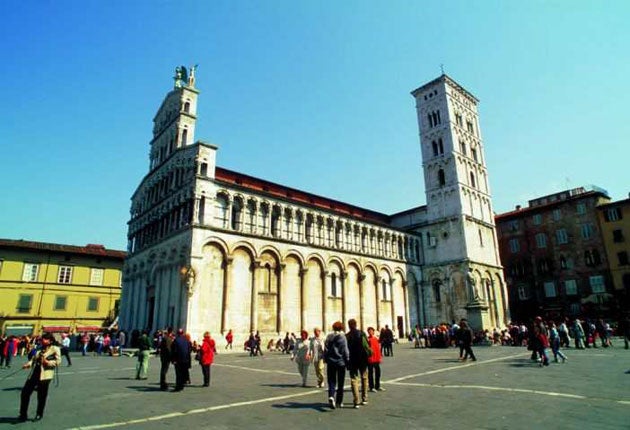The Independent's journalism is supported by our readers. When you purchase through links on our site, we may earn commission.
Madama Butterfly, Floria Tosca – they all came from Lucca
Visit this Tuscan city as it marks the 150th birthday of its son, Puccini, says Adrian Mourby

On 22 December, the city of Lucca will celebrate Giacomo Puccini's 150th birthday. But the Tuscan maestro is only one famous Puccini in a city that employed five generations of his family as composers. Moreover, Luigi Boccherini and the opera composer Alfredo Catalani were also born in Lucca. For hundreds of years this hugely rich, fiercely independent trading city was a great patron of the arts.
From behind its massive walls, Lucca defied the Medicis in Florence, retaining its autonomy right until Napoleon imposed his sister as Grand Duchess. Anyone who has read War and Peace may remember the opening line: "Eh bien, mon prince, so Genoa and Lucca are now no more than private estates of the Bonaparte family."
Actually, the Lucchese shut their gates on Elisa Bonaparte Baciocchi and the only way the nouveau aristocrat was able to take up residence was to have herself hoisted over the walls in a basket. The Puccinis were already composing in Lucca when these events occurred, and when the Bonapartists fled the city in 1815, Puccini's grandfather, Domenico, was poisoned at a city banquet for having supported the wrong faction.
Lucca has had its share of Puccini dramas. Michele, Puccini's father, died tragically young and his wayward son fled Lucca in 1884 when it was discovered that he was having an affair with the wife of a schoolfriend.
Today, Lucca is an easy-going city to visit, tranquil and well preserved, but not dusty and quaint like some Tuscan hilltop cities. This former Roman garrison has always been affluent. Its Art Nouveau shop fronts attest to 19th-century prosperity that built on vast wealth from the medieval silk trade. A good place to start a walking tour would be Palazzo Guinigi, beneath the tree-topped tower that is a postcard symbol of the city. Once Lucca was crammed with 130 towers like this one. Now there are only two. Palazzo Guinigi has no direct association with Giacomo Puccini, but it is currently hosting an anniversary exhibition, Puccini e Lucca.
Walking south brings you to Bernadini, a rectangular Renaissance piazza that provides an important footnote in the composer's life. It was here that the amorous young Puccini came to give piano lessons to his friend's wife. Once their affair was discovered, Puccini fled to Torre del Lago on the coast. Here he began to compose seriously and eventually he built a house, Casa Puccini, where La bohème, Tosca and Madama Butterfly were written.
Walking down Santa Croce you cross Via Fillungo, where Caffè Di Simo is the latest incarnation of Caselli's, the café where Puccini gathered with other would-be artists and composers including Pietro Mascagni who went on to compose Cavalleria rusticana. At the end of Via Roma you come to the original Roman forum of Lucca, now known as Piazza San Michele. Puccini must have crossed here many times because his family home is located on the other side.
It is rather typical, alas, that Italian bureaucracy has closed Puccini's birthplace in the year of his 150th celebrations. Evidently, there are arguments over who pays for the refurbishment of this spacious apartment, which now serves as a museum. Down below in the square, however, there is a rather debonair statue of the composer, languidly seated in a chair, by Tuscan sculptor Vito Tongiani.
Passing by the Piccolo Hotel Puccini, and turning down Via Veneto, you enter Piazza Napoleone, an unusually large open space for Lucca. It was created by Elisa Bonaparte who had the church of San Pietro Maggiore demolished so that she would have a parade ground in front of the Palazzo Ducale, her new home.
Puccini connections resume in Piazza del Giglio, where the Puccini Institute is located in the town's theatre. This route concludes outside the Gothic cathedral of San Martino, where Puccini was taught to play the organ by his uncle.
What is best of all is that a Puccini trail around Lucca shows the whole city off to such great effect. Puccini may be 150, but the city of his birth predates him by 2,000 years. Both are worth our time and attention.
Compact facts
How to get there
Adrian Mourby travelled to Pisa with British Airways (0844 493 0787; www.ba.com), which offers return flights from £107 per person.
Car hire was provided by Holiday Autos (0870 400 0010; www.holidayautos.co.uk), which offers a week's rental from £125.
Join our commenting forum
Join thought-provoking conversations, follow other Independent readers and see their replies
Comments
Bookmark popover
Removed from bookmarks